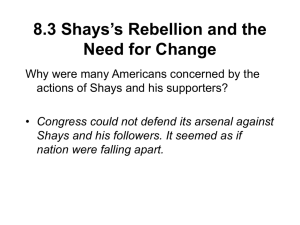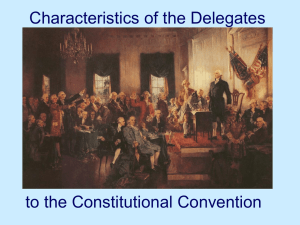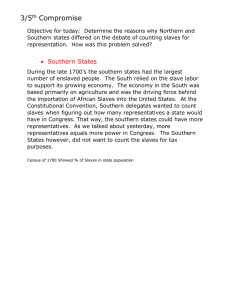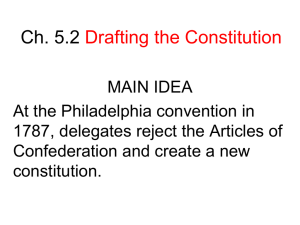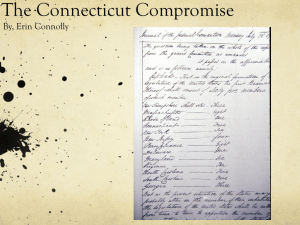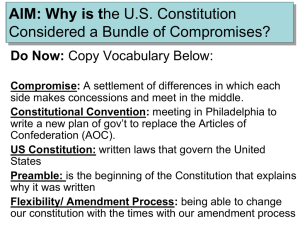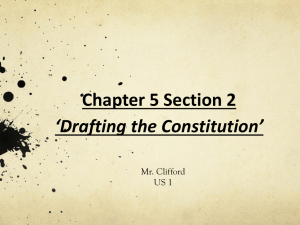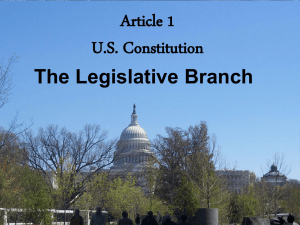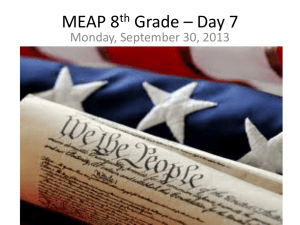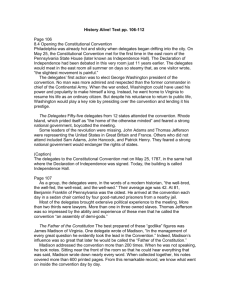Chapter 8 Vocabulary
advertisement
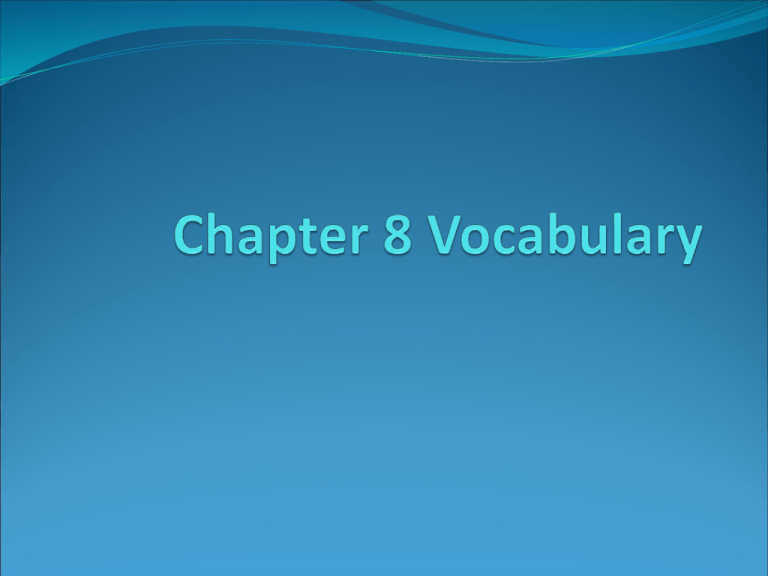
Sovereignty Freedom to self govern. Independent Free Unicameral One branch of government Bicameral Two branches of government Federalist For the federal government. Your belief in a strong central government Antifederalist Weak central government State has the most power – not the central government Republic A country governed by elected representatives Our officials will always be elected Enlightenment All people have the right to pursue happiness Constitution A written plan of the basic plan of government Set of rules and laws Arsenal 8.3 Shay’s Rebellion and the Need for Change Why were many Americans concerned by the actions of Shays and his supporter? Congress could not defend its arsenal against Says and his followers. It seemed as if the nation were falling apart 8.4 Opening the Constitutional Convention What beliefs did the delegates share? What ideas divided them? Shared: the government should be run as a republic (with elected officials) Disagreed: How strong the central government was going to be 8.5 Issue: Hoe should states be represented in the New Government How did the Virginia Plan and the New Jersey Plan differ? Virginia Plan: Two houses of Congress. (Bicameral) New Jersey Plan: One house of Congress. (unicameral) Both agreed that there should be three branches of government (Legislative, Judicial, and Executive) James Madison What is he most known for…. HE WROTE THE CONSTITUION 8.6 Resolution: The Great Compromise What compromise did the delegates create to resolve the issue of state representation? The Great Compromise called for two houses of Congress. In the first house (or the House of Representatives) representation would be based on population. In the second house (or the Senate) each state would have two senators elected by the state legislatures. 8.7 Issue: How Should Slaves Be Counted? How did the views of delegates from northern states differ from those of delegates from southern states on this issue? The North wanted slaves counted for taxation but not representation or the North did not want the slaves counted for the population so the south would have less representatives in Congress. Leaving the south with less votes The South wanted slaves counted for representation but not taxation. If the slaves were taxed – then the owners of the slaves would have to pay the extra taxes. If the slaves counted for the population they would get more votes in Congress. 8.8 Resolution: The Three-Fifths Compromise What compromise did the delegates create to resolve this issue? Three fifths of the slaves would be counted for both taxation and representation. So three out of five slaves would be counted towards population. This will make the population in the south go up and will give them more representatives in the House of Representatives. 8.9 Issue: How Should the Chief Executive Be Elected? Why didn’t the delegates agree on how the national executive should be chosen? Appoint their “flunkies” -- They would be picked and have to “owe a favor” There should be a special group of electors to elect the president. (done because they did not think the “common people” were smart enough to pick the president) The states would vote for their representatives. 8.10 Resolution: The Electoral College What compromise did the delegates create to resolve this issue? The executive would be elected by a special body called the Electoral College. Delegates to the Electoral College would be chosen by the states. 8.11 The Convention Ends Why did some delegates refuse to sign the final draft of the Constitution? Some feared that it gave the national government too much power and did not protect the rights of the people. 8.12 The Constitution Goes to the Nation What were The Federalist Papers, and why were they written? The Federalist Papers were articles written by James Madison, Alexander Hamilton, and John Jay urging ratification of the Constitution.
